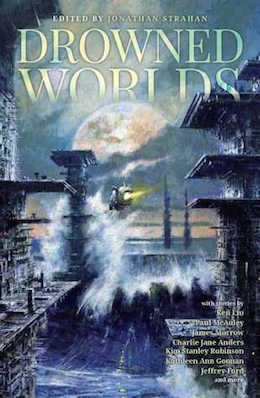The most recent Solaris anthology edited by Jonathan Strahan, Drowned Worlds, explores the futures we might encounter given our rising oceans, our collapsing ecosystems, and our unwillingness to stop the precipitous sink into the sea. Containing original fiction from folks like Ken Liu, Charlie Jane Anders, Nalo Hopkinson, and Sam J. Miller, this anthology is a quick, engaging, immersive read.
With a distinct political message, too, it’s an interesting reading experience: science fiction in its overtly didactic mode (though it is always, by virtue of asking the “what if” question, didactic to some extent). I appreciate dipping my toes into this vein of speculation, and these stories do a solid job of balancing their big ideas with their characters to make good stories.
There were a few pieces that lingered with me longer than the rest, including Charlie Jane Anders’ “Because Change Was the Ocean and We Lived by Her Mercy.” As an approach to communal living, growing up, and the strange shifts of human culture in a post-flood world, this is top-tier work. It’s domestic, personal, and witty. The protagonist discovers plenty about the world around them, the vagaries of people being together with people and the tides of little communities. It’s intimate, it’s clever, and it gives me a more realistic and honest approach to the whole “commune life” idea than I often see. I also appreciated the acknowledgement of a spectrum of genders and approaches to presentation that’s just natural background in the piece.
“Venice Drowned” by Kim Stanley Robinson, on the other hand, is intimate in a more traditionalist sense. This feels like a piece that could be historical fiction, except it’s set in the post-deluge future. The protagonist’s attachment to his drowned culture, particularly as revealed in the conflicts over tourism and wealth, all come together in an intriguing fashion. His rough ease with his family, his community, and his survival on the waters are all somehow quiet and close to the reader despite their occasional brusqueness.
“Inselberg” by Nalo Hopkinson is the closest to horror of the bunch, with its tourist-eating landscapes and capricious magics told through the guide’s narration. I appreciated the sense of being an audience member that the point of view gives; it builds the tension with fantastic skill, and it’s hard to slip free of the grip of the narrative winding you in tight. Solidly creepy, a fine compliment to all of the rather soft-edged stories here. “Inselberg” also addresses issues of colonialism and submerged histories in a way that is smart and incisive, amongst its disturbing occurences.
Catherynne M. Valente’s “The Future is Blue” also stuck with me, because it is one of the pieces that does staunchly refuse the idea of going back, of recreating past mistakes. It also manages to be a sort of coming of age story at the same time—a fairly raw and unpleasant one, but containing moments of joy all the same. Tetley knows she’s done the right thing, even if the rest of the world around her on the garbage island doesn’t believe her. The scattered scenes of her abuse at the hands of her fellow citizens throughout her narrative of how it came to be this way is disturbing, given her positivity; overall, the tone and arc of this one make it one of the stranger stronger stories of the lot.
There is one thing about this collection that gives me pause: while the introduction implies that this set of stories will address or combat the looming crisis of our climate collapsing, the vast majority of the pieces contained herein are set well enough past that collapse that it’s no longer the focal point. Furthermore, they’re often rather romantic or “settled-in” stories of life after the inevitable. On the one hand, this is an appealing sort of forward-thinking, “human life continues on” attitude—focusing on our resilience as a species, et cetera. On the other, it also makes me feel rather doomed, as if even our best and brightest imagination-kings can’t think of a solution to fight the thing as it happens, or to turn it back.
There isn’t even much in the way of real horror at the circumstances, just resignation and resilience. Facing down our current political climate, I get a little bit of an itch when the voices of those concerned with climate—associated as they often are with the liberal or leftist parties—sound resigned and accepting rather than raging and ready to fight. It’s an issue more broadly that seems oddly reflected here as well.
Overall, though, from a science-fictional standpoint: the exploration of human survival after catastrophe, or finding ways to thrive as a species on our damaged planet and in our flooded ecosystems, is engaging and I did appreciate it. Several of these stories have the “big idea” thing going for them, and others have a more humanist touch. The balance of those types of tales makes this a readable and pleasant diversion, a solid collection of current work from people who often write in the climatological sector of sf.
Drowned Worlds is available now from Solaris.
Lee Mandelo is a writer, critic, and editor whose primary fields of interest are speculative fiction and queer literature, especially when the two coincide. They have two books out, Beyond Binary: Genderqueer and Sexually Fluid Speculative Fiction and We Wuz Pushed: On Joanna Russ and Radical Truth-telling, and in the past have edited for publications like Strange Horizons Magazine. Other work has been featured in magazines such as Stone Telling, Clarkesworld, Apex, and Ideomancer.










